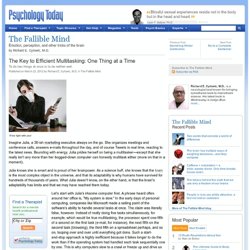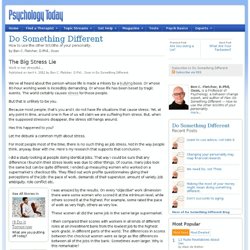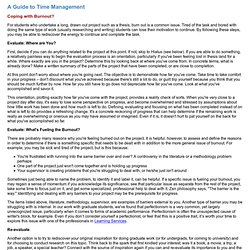

19. Skills You'll Need to Beat Anxiety. {*style:<b> Anxiety and Perfectionism 1. The Ability to Tolerate Uncertainty </b>*} Studies have shown that intolerance of uncertainty is a key factor in anxiety and depression ( Study example ). Intolerance of uncertainty is anxiety when you can't be 100 percent sure a negative event won't happen. People who can't tolerate uncertainty often avoid situations, procrastinate, ressurance seek, delay taking action, do excessive checking, and refuse to delegate.
How to Overcome the Anxiety of an Upcoming Deadline. How to Prevent Stress from Shrinking Your Brain. The Key to Efficient Multitasking: One Thing at a Time. Imagine Julia, a 30-ish marketing executive always on the go.

She organizes meetings and conference calls, answers e-mails throughout the day, and of course Tweets in real time, reacting to the latest news. Bounding with energy, Julia prides herself on being a multitasker—except that she really isn't any more than her bogged-down computer can honestly multitask either (more on that in a moment). Julia knows she is smart and is proud of her brainpower. As a science buff, she knows that the brain is the most complex object in the universe, and that its adaptability is why humans have survived for hundreds of thousands of years.
What Julia doesn't know, on the other hand, is that the brain's adaptability has limits and that we may have reached them today. Let's start with Julia's irksome computer first. Now, what about Julia's brain? The world has changed enormously since the dawn of humankind, yet we still have the same brain as our distant ancestors.
Stress and Self Care: Top 10 Self Care Strategies for Stress Reduction. Stress and Stress Management - Causes, Symptoms, Stress Relief Tips and Stress Tests. Illuminating Research on Coping Styles. We all react to stress in our own ways. When the stresses of life get to us, certain coping styles become our "go-to" responses. Some of us may lean on our friends for support as a way to feel better and gain our bearings. Others may hunker down and look for a solution to minimize the stress. It can also be tempting to avoid those things that stress us, and think about something else. Have you ever wondered which coping styles are most effective? Results showed that those who sought social support or coped with problem-engagement did experience lower levels of cortisol, showing that these strategies can effectively diminish the experience of stress and the stress response.
While this may seem obvious once you know the results of the study--we all "know" that running away from problems doesn't solve anything--there was an important point that stood out for me. Coping Resources For Stress Management: Source: O'Donnell K, Badrick E, Kumari M, Steptoe A. La siesta ayudaría a disminuir el efecto de las emociones negativas. Un reciente estudio de la Universidad de Berkeley reveló que existiría una relación entre el control de las emociones y el sueño activo -cuando los párpados se mueven al dormir-, pudiendo este último ayudar a regular los malos momentos del día para despertar con el ánimo renovado.

De este modo, el sueño con rápidos movimientos oculares (REM) inhibiría la actividad de la amígdala -la culpable del estrés post traumático-, gracias a doce horas diarias de sueño distribuidas entre la noche y una pausa durante el día conocida como siesta. Asimismo, el efecto del sueño con rápido movimiento ocular se traduce en la disminución de percepción de novedad frente a las emociones, lo que permite no sobredimensionar los conflictos del día y estar más receptivos frente a hechos positivos, señala el documento de la Universidad de Berkeley publicado en su portal. Beware of burnout: Take the test. Burnout is as much about your dreams as it is about your work, because burnout is the gap between your expectations and your ability to meet them.

Jennifer Senior has a great article in this week’s New York Magazine about about burnout, which I will quote from here. Burnout is not about how many hours you work, (contrary to Lisa Belkin’s New York Times column this week), but if the hours you work bring you desired results. For example, if you have very flexible hours and can go on an early date and then go back to work after dinner and you get eight hours of sleep, a 100-hour week might be fine for you. In fact, Ayala Pines, professor at Ben-Guiron University at the Negev, found that serial entrepreneurs, known for working very long hours, were the workers least prone to burnout. (Those most prone are pediatric nurses in burn units.) 1. The effect of burnout is depersonalization, according to Barry Farber, professor at Columbia University.
The Big Stress Lie. We’ve all heard about the person whose life is made a misery by a bullying boss.

Or whose 80-hour working week is incredibly demanding. Or whose life has been beset by tragic events. The world certainly causes stress for those people. But that is unlikely to be you. Coping with Burnout? - Time Management - University of Guelph. For students who undertake a long, drawn out project such as a thesis, burn out is a common issue.

Tired of the task and bored with doing the same type of work (usually researching and writing) students can lose their motivation to continue. By following these steps, you may be able to rediscover the energy to continue and complete the task. Evaluate: Where are You? First, decide if you can do anything related to the project at this point. If not, skip to Hiatus (see below). Stress and Stress Management - Causes, Symptoms, Stress Relief Tips and Stress Tests.